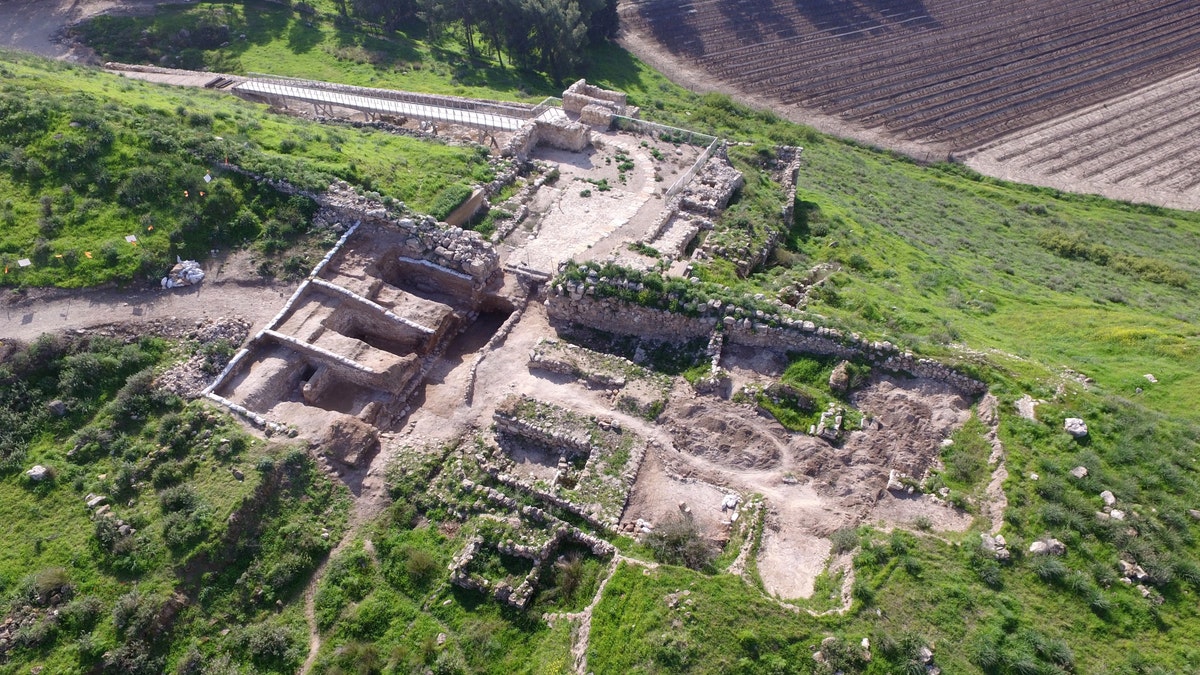
The Tel Lachish National Park and the gate structure (left) that was exposed. (Photographic credit: Guy Fitoussi, courtesy of the Israel Antiquities Authority).
Israeli archaeologists have unearthed a 2,900-year-old gate-shrine they say confirms the biblical story of King Hezekiah, who mandated the worship of God and the rejection of all other deities.
The gate-shrine in Tel Lachish National Park was uncovered decades ago, but a new excavation has completely exposed the gate, which is the largest one known from the First Temple period.
“The size of the gate is consistent with the historical and archaeological knowledge we possess, whereby Lachish was a major city and the most important one after Jerusalem,” said excavation director Sa'ar Ganor.
According to the Book of Kings, he said, “the cities’ gates were the place where ‘everything took place’: the city elders, judges, governors, kings and officials — everyone would sit on benches in the city gate. These benches were found in our excavation.”
Related:
The 80x80-foot Lachish city gate is 13 feet tall and consists of six chambers, three on either side of the main street that passed between them. Among the artifacts found in its rooms were benches with armrests, jars, a large number of scoops for loading grain and stamped jar handles that bear the name of the official seal impression. Two of those impressions say “belonging to the king of Hebron.”
The continuation of the building is the gate-shrine, whose steps “ascended to a large room where there was a bench upon which offerings were placed,” Ganor said. “An opening was exposed in the corner of the room that led to the holy of holies; to our great excitement, we found two four-horned altars and scores of ceramic finds consisting of lamps, bowls and stands in this room.
“It is most interesting that the horns on the altar were intentionally truncated,” he said “That is probably evidence of the religious reform attributed to King Hezekiah, whereby religious worship was centralized in Jerusalem and the cultic high places that were built outside the capital were destroyed.”
The archaeologists also uncovered a stone fashioned in the shape of a chair, with a hole in its center — a toilet that was installed to desecrate the place.
This is the first time archaeologists have confirmed the assertion in the Bible that toilets were installed in cultic locations to destroy them. Lab tests suggest the toilet was never used, leading the archaeologists to conclude that it was installed there as a symbol.
“The uncovering of these finds joins a long list of discoveries that enlighten us about our historic past, a past that is manifested in our country’s soil and in the writings of the Book of Books,” said Miri Regev, Israel’s minister of culture and sport.
“The Bible – the founding book of the Jewish people, draws the country’s boundaries and the heritage of the Jewish people that was exiled from its country and returned to its homeland,” she continued.
“It boldly commemorates the way of our forefathers, the prophets, the kings and the judges, and the Israel Antiquities Authority deserves praise for this important discovery, a discovery that deepens our connection to our ancestors who walked this land.”
The Nature and Parks Authority and Israel Antiquities Authority plan to open the gate, which is currently covered, to visitors after they have developed the site and conserved the artifacts.




















